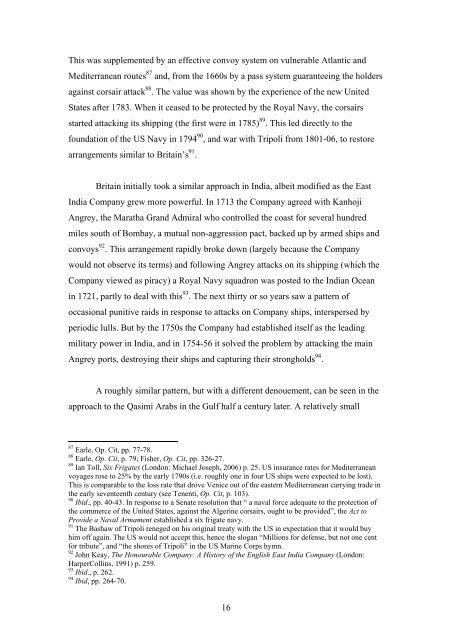to get the file - Defence Academy of the United Kingdom
to get the file - Defence Academy of the United Kingdom
to get the file - Defence Academy of the United Kingdom
Create successful ePaper yourself
Turn your PDF publications into a flip-book with our unique Google optimized e-Paper software.
This was supplemented by an effective convoy system on vulnerable Atlantic and<br />
Mediterranean routes 87 and, from <strong>the</strong> 1660s by a pass system guaranteeing <strong>the</strong> holders<br />
against corsair attack 88 . The value was shown by <strong>the</strong> experience <strong>of</strong> <strong>the</strong> new <strong>United</strong><br />
States after 1783. When it ceased <strong>to</strong> be protected by <strong>the</strong> Royal Navy, <strong>the</strong> corsairs<br />
started attacking its shipping (<strong>the</strong> first were in 1785) 89 . This led directly <strong>to</strong> <strong>the</strong><br />
foundation <strong>of</strong> <strong>the</strong> US Navy in 1794 90 , and war with Tripoli from 1801-06, <strong>to</strong> res<strong>to</strong>re<br />
arrangements similar <strong>to</strong> Britain’s 91 .<br />
Britain initially <strong>to</strong>ok a similar approach in India, albeit modified as <strong>the</strong> East<br />
India Company grew more powerful. In 1713 <strong>the</strong> Company agreed with Kanhoji<br />
Angrey, <strong>the</strong> Maratha Grand Admiral who controlled <strong>the</strong> coast for several hundred<br />
miles south <strong>of</strong> Bombay, a mutual non-aggression pact, backed up by armed ships and<br />
convoys 92 . This arrangement rapidly broke down (largely because <strong>the</strong> Company<br />
would not observe its terms) and following Angrey attacks on its shipping (which <strong>the</strong><br />
Company viewed as piracy) a Royal Navy squadron was posted <strong>to</strong> <strong>the</strong> Indian Ocean<br />
in 1721, partly <strong>to</strong> deal with this 93 . The next thirty or so years saw a pattern <strong>of</strong><br />
occasional punitive raids in response <strong>to</strong> attacks on Company ships, interspersed by<br />
periodic lulls. But by <strong>the</strong> 1750s <strong>the</strong> Company had established itself as <strong>the</strong> leading<br />
military power in India, and in 1754-56 it solved <strong>the</strong> problem by attacking <strong>the</strong> main<br />
Angrey ports, destroying <strong>the</strong>ir ships and capturing <strong>the</strong>ir strongholds 94 .<br />
A roughly similar pattern, but with a different denouement, can be seen in <strong>the</strong><br />
approach <strong>to</strong> <strong>the</strong> Qasimi Arabs in <strong>the</strong> Gulf half a century later. A relatively small<br />
87 Earle, Op. Cit, pp. 77-78. <br />
88 Earle, Op. Cit, p. 79; Fisher, Op. Cit, pp. 326-27. <br />
89 Ian Toll, Six Frigates (London: Michael Joseph, 2006) p. 25. US insurance rates for Mediterranean<br />
voyages rose <strong>to</strong> 25% by <strong>the</strong> early 1790s (i.e. roughly one in four US ships were expected <strong>to</strong> be lost). <br />
This is comparable <strong>to</strong> <strong>the</strong> loss rate that drove Venice out <strong>of</strong> <strong>the</strong> eastern Mediterranean carrying trade in <br />
<strong>the</strong> early seventeenth century (see Tenenti, Op. Cit, p. 103).<br />
90<br />
Ibid., pp. 40-43. In response <strong>to</strong> a Senate resolution that “ a naval force adequate <strong>to</strong> <strong>the</strong> protection <strong>of</strong><br />
<strong>the</strong> commerce <strong>of</strong> <strong>the</strong> <strong>United</strong> States, against <strong>the</strong> Algerine corsairs, ought <strong>to</strong> be provided”, <strong>the</strong> Act <strong>to</strong> <br />
Provide a Naval Armament established a six frigate navy. <br />
91 The Bashaw <strong>of</strong> Tripoli reneged on his original treaty with <strong>the</strong> US in expectation that it would buy <br />
him <strong>of</strong>f again. The US would not accept this, hence <strong>the</strong> slogan “Millions for defense, but not one cent <br />
for tribute”, and “<strong>the</strong> shores <strong>of</strong> Tripoli” in <strong>the</strong> US Marine Corps hymn.<br />
92 John Keay, The Honourable Company: A His<strong>to</strong>ry <strong>of</strong> <strong>the</strong> English East India Company (London:<br />
HarperCollins, 1991) p. 259. <br />
93<br />
Ibid., p. 262.<br />
94<br />
Ibid, pp. 264-70. <br />
16

















